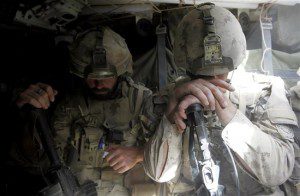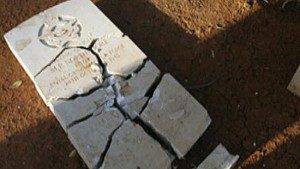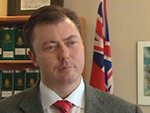
I had a chance encounter with a member of the Wounded Warriors the other night. I had just completed a presentation about the battle at Vimy Ridge at the Whitby Public Library. On our way out of the library, he gave me an update on plans the group has to take about 30 younger Canadian vets on a bicycle tour of Normandy later this spring. (By the way, they’re doing it entirely on private donations. No government funding.) He recounted a recent exchange between his group and a Veterans Affairs Canada committee reviewing the needs Canada’s latest vets – those returning from Afghanistan. He was encouraging greater support for vets with post-traumatic stress disorder.
“Give them time,” the VAC rep apparently said. “They’ll get over it.”
My acquaintance with the Wounded Warriors group said it was all he could do to contain his anger. Still steaming over VAC’s apparent indifference to the needs of vets with PTSD, my acquaintance went on to point out that many negative societal statistics that Canadian municipalities face these days are dominated by former troops who served in Afghanistan. In fact, if the U.S. statistics are any indication, as much as half the country’s homeless may well be vets from recent wars in the Middle East.

It appears, however, that miscommunication, indignity and indifference over veterans’ needs at the VAC level are only the beginning of current problems facing Canadians who have served their country in uniform during modern wars. The recent desecration of flyer Martin Northmore’s grave is one offshore example. It appears that Libyans offended by U.S. troops burning copies of the Quran, this week decided to retaliate by overturning and chopping to bits the tombstone of the Second World War flying officer. Northmore’s Hurricane fighter was shot down by enemy fire in October 1943 as he escorted an Allied convoy over Italy. He was buried in the Benghazi War Cemetery, along with 10 other Canadians who all fought and died in the campaign to liberate Libya from the Nazis.
Then there’s the case of the upcoming inauguration of the first ever monument erected to honour Commonwealth air crewmen of Bomber Command. This summer, the British will pay tribute to the memory of those who served in the nightly operations to bomb enemy targets in Hitler’s Fortress Europe. The monument itself is in part constructed of materials retrieved from former Halifax bombers of Canada’s No. 6 Group, which flew thousands of sorties from RCAF bases around England between 1942 and 1945. Typical of those nightly thousand-bomber raids deep into Nazi-occupied Europe, as many as 10 per cent of the aircraft and their eight-to-10-man crews did not return; 55,573 Bomber Command airmen died in the war.
Despite the significance of the memorial (and the highest-per-capita service fatalities during the war), however, it appears the Harper government has chosen to send perhaps 25 veteran delegates to the inauguration on June 28. On the surface the event appears to be a casualty of economic belt-tightening; underneath it’s likely the decision to organize a revisit of veteran Canadian aviators would serve too small a political constituency for the investment required. In current parlance – not enough bang for the buck.

Then, there’s the case of MP Rob Anders. Last week, at a Halifax meeting of the volunteer group, Veterans Emergency Transition Services, Jim Lowther and David MacLeod offered suggestions for dealing with the homeless problem faced by former soldiers. The two former members of the Canadian Forces complained that Anders fell asleep during their presentation. Anders apparently denied the accusation and accused the men of being “NDP hacks” akin to Putin, the president of Russia.
“I am a card-carrying member of the Conservative party,” Lowther later told CBC Radio. “I hope (Anders) does the right thing and apologizes to those on the committee … and steps down.”
Indeed, Lowther told the Ottawa Citizen that several hundred veterans had emailed members of the V.E.T.S. committee, demanding Anders be removed from the hearings because he had little understanding of the needs of veterans.
The truth be known, since the first Canadian veterans returned from the Great War in Europe in 1918, this country’s private and public sectors have never been fully able to deal with those returning to civvy street. Following the Second World War in 1945, commentators warned, that “the Canadian soldier is just about the biggest problem Canada has to face.” The Army’s Maple Leaf newspaper headlined, “Veterans warned against creating new Depression.” And even Richard Malone, head of public relations for the Canadian Army, offered this stark assessment.
“Home life is a little hard getting used to all of a sudden,” he wrote. “People’s daily interests back here are miles apart from our daily concerns of the past.”
It’s time for those directing home life to consider veterans’ daily concerns, for their interests and the country’s.